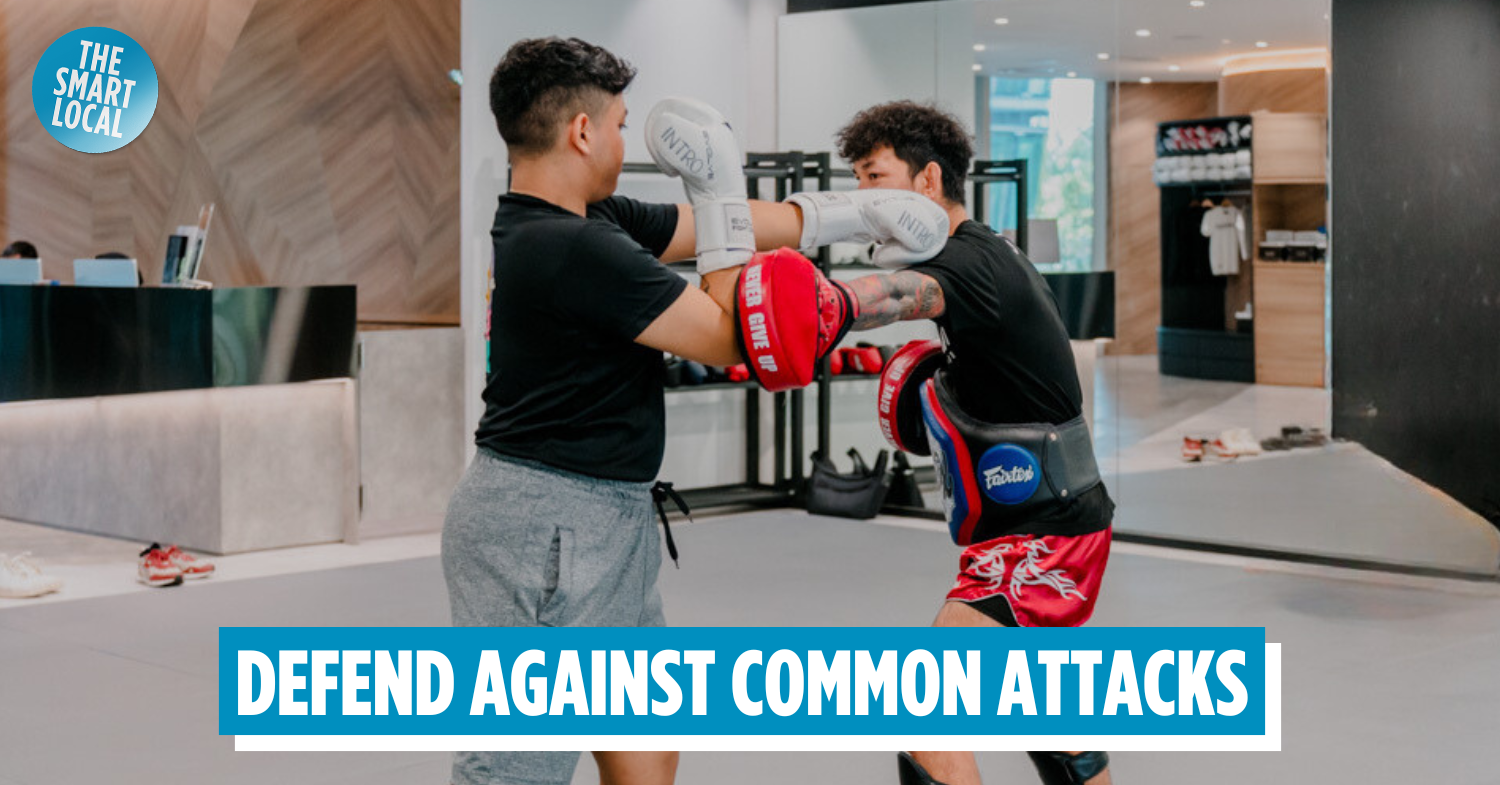Easy self-defence techniques
Growing up in one of the world’s safest countries may have left some of us in a safety bubble, making us ill-prepared for the dangers out there. Although we may not encounter threatening situations commonly, it doesn’t hurt to know how to deal with them on the off chance they arise.
For example, if you’re travelling solo or in a country known for petty crimes against tourists, wouldn’t it be great to know how to defend yourself? Here’s a list of easy self-defence techniques you can learn in under 3 minutes to quickly retaliate against an attack or help fizzle out a fight. KIV for peace of mind.
1. Long guard & check block
For blocking punches & kicks
These self-defence moves are both blocking moves that help lessen the blow of an attack on the body. The long guard aids in defending the upper body, with your forearm blocking oncoming punches and elbow jabs. It also has the bonus of creating distance between you and the attacker, hence its name.

Long guard steps:
- When you see someone throwing a punch, stretch out your lead arm straight ahead with your palm open.
- Bring your dominant hand across your face near your temple to create a diagonal block against strikes from the side.
- Make sure you’re able to still see through your guard and be prepared to counter with an elbow or a knee.
- Remember to keep your chin down and your eyes looking forward.
The check block protects your body from kicks and knee jabs, by creating a barrier with your elbow and knee. When their leg hits your barrier, the force they use to hurt you ricochets back to them, as the bones of our knee and elbow are hard enough to repel it.

Check block steps:
- Make your stance by turning your shin out at a 45-degree angle.
- Curl your dominant elbow up and raise your knee to connect the two, making sure not to drop your elbow
- Make sure your other hand is still on guard protecting your face and upper body.
2. Sliding & leaning back
For distancing yourself from surprise attacks quickly
Sometimes the easiest way to dodge an attack is by moving away from it. The most common ways to slip and evade are sliding and leaning. Sliding involves dodging kicks and knees by moving your mid to lower body backwards, in anticipation of a kick.

Sliding steps:
- When you see someone reaching their leg out for a kick, slide your legs backwards to move your body into a C-shape. This hollows out the area where the kick is directed.
- Keep your hands and arms in an inverse V in front of your head. This is done so that you can subdue any high kicks to the face.
Leaning back, on the other hand, is for upper-body attacks where you lean back and swerve from punches, elbows, and even high kicks.
Leaning back steps:
- When you anticipate someone is about to punch you, simply bend your back and head backwards, away from the attack.
- Keep your dominant hand close to your face, while your other hand drops down.
- Make sure to keep your legs firm so that you don’t lose balance and fall backwards.
3. Push kicks
For pushing away oncoming attackers with a single move
This self-defence move differs from the average kick as it focuses on creating more distance between you and the attacker. Push kicks are exactly what they sound like, they push the attacker away with the balls of your foot.
Push kick steps:
- Bring your knee up to your torso as if you were getting ready for a kick.
- With force, extend and kick your leg out, pushing away your attacker with the ball of your foot.
- Return your leg to its original position to keep balance.
- Make sure your opposite side’s hand is continuously protecting your face from any surprise attacks.
4. Elbows & knees
For counter-attacking an aggressive assailant
Some attackers continuously pursue, shove, and push to tire you out, aiming for you to become vulnerable once your energy is drained. To halt them from coming near you or even trying to grab you, a simple strike can stun and injure them just enough.
One of the easiest and yet impactful ways to achieve this is through elbows and knees. This is because the bones of your elbows and knees are hard enough to be used as defences and inflict some amount of pain on them.
Elbow steps:
- Take a step forward with your lead leg.
- Swing your rear forearm to shoulder level and lock your elbow at a 90-degree angle parallel to the ground.
- Swing your elbow forward to hit your attacker, aiming to hit with the tip of your elbow.
- Make sure your other hand is up against your face, to protect you from any other strikes.

Knee steps:
- Stand with your dominant leg behind you and your other leg in front, with weight on the balls of your feet.
- With a slight step to the front, swing your dominant knee forward, thrusting your hips for a more accurate hit.
- Make sure your other hand is constantly protecting your head and face from surprise attacks.
5. Clinch & throw
For defending against someone trying to grab you
In a worst-case scenario, your attacker may get within close quarters of you. Should this happen, the clinch and throw could be an effective move. Don’t be deterred by the “throw” aspect of this move, as it’s more of a trip than an actual throw. This move involves grabbing the attacker’s head and shoulder and pushing them past you.
This is one of the more complex moves on the list, but once you get the rhythm going it should feel like clockwork. This move is also very useful in ending conflict early by allowing you some lead time to get away from the situation, once you’ve thrown your attacker down.

Clinch and throw steps
- Take your dominant hand and grab the back of your attacker’s neck, trying to hold it down.
- At the same time, stretch your other hand out – similar to the long guard move – to defend any sideways punches and kicks.
- Once you’ve grabbed the neck and shoulder, muster up your strength and try to pull your attacker towards your side.
- While they are still disoriented, stretch out your leg or knee to trip them onto the floor and out of your reach.
Stay protected with these Muay Thai self-defence techniques

All these moves are a part of Muay Thai, a martial art that originated in Thailand and is known as the “Art of Eight Limbs”. The 8 limbs in question are 2 hands, 2 legs, 2 elbows, and 2 knees.
Muay Thai is great for self-defence as it focuses on adapting defences for attacks from all angles. The moves are relatively straightforward to learn even for anyone who has never tried martial arts and therefore, come to good use in high-pressure situations.
Though you can learn each move in under 3 minutes, there’s no better way to learn Muay Thai in Singapore than through the guidance of a professional. And who better to teach you how to defend yourself than Muay Thai World Champions themselves?

Evolve MMA is a mixed-martial arts academy, with 5 locations across Singapore, that has Muay Thai World Champions as instructors. As an MMA academy, it has martial arts classes not just for Muay Thai, but Brazillian Jiu Jitsu, Boxing, and other martial arts as well.
One of their key services is a complimentary 30-minute 1-one-1 trial class with one of their world champion instructors. This private session allows both you and the coach to discuss your goals and set the tone on how your individual journey will go. Whether you want to get fitter, improve stamina, learn a new skill, or build strength, there’s a martial art for you.

There’s currently a special promotion, just for TheSmartLocal readers, so listen up. The first 100 readers who submit a trial class request and quote <TSL X EVOLVE> will get an Evolve MMA t-shirt for free.
You can also be one of 50 winners in their lucky draw and win a free 1-week membership with unlimited classes. Simply fill up the online form on their website.
So, take that first step in learning how to protect yourself through Evolve MMA’s trial class. Aside from learning self-defence, you’d also be keeping yourself fit and finding a community within the MMA circles.
Sign up for a free 1-on-1 trial class with a world champion
This post is brought to you by Evolve MMA.
